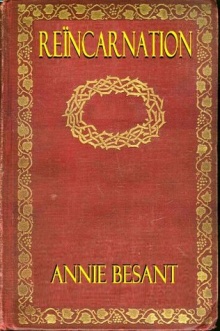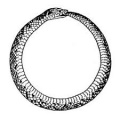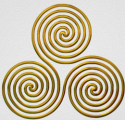Reincarnation: Difference between revisions
Pablo Sender (talk | contribs) |
|||
| Line 110: | Line 110: | ||
*[http://www.blavatsky.net/index.php/transmigration-of-souls# Transmigration of Souls] by W. Q. Judge | *[http://www.blavatsky.net/index.php/transmigration-of-souls# Transmigration of Souls] by W. Q. Judge | ||
*[http://www.theosophy-nw.org/theosnw/reincar/re-wqj.htm# The Necessity for Reincarnation] Attributed to William Q. Judge | *[http://www.theosophy-nw.org/theosnw/reincar/re-wqj.htm# The Necessity for Reincarnation] Attributed to William Q. Judge | ||
=== Books === | === Books === | ||
Revision as of 22:22, 27 December 2023
Reincarnation literally means "to enter again the the flesh" (from Latin re=again, in=into, carnem=flesh). It is the theory that after the death of the body, consciousness returns to life in a new physical form. In the Theosophical tradition, a human soul can only reincarnate in a human body. Other traditions accept the possibility of reincarnation in an animal or plant. Other terms frequently used interchangeably with the word reincarnation are metempsychosis and transmigration. In Buddhism, the preferred term is rebirth.
The doctrine of reincarnation is a central tenet within the majority of Indian religions such as Hinduism, Jainism, Sikhism and Buddhism (although the latter prefer to use the word re-birth). In the West, the idea was also fundamental to some Greek philosophers as well as in other religions such as Druidism and in some schools of Judaism and early Christianity.
General description
H. P. Blavatsky defined it as follows:
Reincarnation, or Re-birth; the once universal doctrine, which taught that the Ego is born on this earth an innumerable number of times. Now-a-days it is denied by Christians, who seem to misunderstand the teachings of their own gospels. Nevertheless, the putting on of flesh periodically and throughout long cycles by the higher human Soul (Buddhi-Manas) or Ego is taught in the Bible as it is in all other ancient scriptures, and "resurrection" means only the rebirth of the Ego in another form.[1]
The entity that reincarnates is the higher ego, and not the personalities:
It is the personal Ego—wrongly believed by the Spiritists to be reincarnated with its personal consciousness a number of times—that appears upon this earth but once, while the Individual Spiritual monad which—like an actor who, although appearing in, and personating every night a new character, is ever the same man—is that which appears on earth throughout the cycle in various personalities.[2]
People may reincarnate in very different social and financial conditions from one life to the next according to the Karma generated:
The Law of Affinity acts through the inherent Karmic impulse of the Ego, and govern its future existence. Comprehending Darwin's Law of Heredity for the body, it is not difficult to perceive how the birth-seeking Ego may be attracted at the time of rebirth to a body born in a family which has the same propensities as those of the reincarnating Entity.[3]
The social status of a being is, of course, a result of Karma; the law being that "like attracts like". The renascent being is drawn into the gestative current with which the preponderating attractions coming over from the last birth make him assimilate. Thus one who died a ryot [peasant] may be reborn a king, and the dead sovereign may next see the light in a coolie's tent.[4]
Although in general terms there is a certain learning from one incarnation to the next, simply going through incarnations does not imply a growth of the Soul. In fact, the more consciousness is attached to physical life, the faster it will reincarnate:
What has the number of incarnations to do with the shrewdness, cleverness, or the stupidity of an individual? A strong craving for physical life may lead an entity through a number of incarnations and yet these may not develop its higher capacities.[5]
Time between reincarnations
Mme. Blavatsky wrote:
Reincarnations in general take place after rather long periods passed in the intermediate and invisible spheres. So that if a Spiritist-Theosophist tells an Occultist-Theosophist that he is a reincarnation of Louis XV, or that Mrs. X is a reincarnation of Joan of Arc, the Occultist would answer that according to his doctrine it is impossible. It is quite possible that he might be a reincarnation of Sesostris or of Semiramis, but the time period that has passed since the death of Louis XV and even of Joan of Arc is too short according to our calculations, which are mathematically correct.[6]
Roughly calculating the number of reincarnations of a person on a planet, the Master K.H. makes the following statement:
One life in each of the seven root-races; seven lives in each of the 49 sub-races — or 7 x 7 x 7 = 343 and add 7 more. And then a series of lives in offshoot and branchlet races; making the total incarnations of man in each station or planet 777. . . . Let us take but one million of years — suspected and now accepted by your science — to represent man’s entire term upon our earth in this Round; and allowing an average of a century for each life, we find that whereas he [a given person] has passed in all his lives upon our planet (in this round) but 77,700 years he has been in the subjective spheres 922,300 years. Not much encouragement for the extreme modern re-incarnationists who remember their several previous existences![7]
However, in the case of children who die, they reincarnate immediately, and many times in the same family. Annie Besant said:
Question — When a child dies at a very early age, is it at all likely to reincarnate with the same parents again if there is an opportunity?
Answer — Yes; it very often takes place. If the love is strong between parent and child, that same ego will seek another form in the same family, and very often the parent will recognize it. I know one lady who was passionately devoted to a child that died and had not the same feeling at all to her other children, until a child was born for whom all the former feeling was awakened, and before she heard of Theosophy she said it must be the same child come back. It was the same ego. Where the ties are strong they assert themselves in a very definite way.
Question — A child dying at the age of eleven would hardly have time to come back?
Answer — No; with a child of eleven it is a different matter altogether.
Question — How old can they be and come back without going through the complete cycle?
Answer — It depends very much on the stage of advancement. An ordinary person up to about seven years of age might be reborn with the same astral body without making a new mental body. But, after that, where the ego is woven into the body it has to pass on to the astral and heavenly world. Of course, a person dying at twelve or thirteen will come back more quickly, because there is so little to work out on the other side.[8]
Do we choose where to reincarnate?
The reincarnating ego has in a sense very little choice in the matter, if by this we mean a deliberate selecting of one’s future family. Such a choice as we understand it is almost non-existent, because the reincarnating ego has but just left the devachan and is sunken into the relative unconsciousness of the gestation period preceding rebirth, and thus is in no condition to choose with self-conscious intent. It is karma, which throughout controls these things; and karma in the abstract is infallible in its action.[9]
Looking back at past lives
Renowned clairvoyant, C. W. Leadbeater, wrote:
Some [people] promptly begin to imagine recollections and declare that in their last incarnation they were Mary Queen of Scots, Cleopatra, or Julius Caesar! Of course such extravagant claims simply bring discredit upon those who are so foolish as to make them. . . .
It is quite true that some people have had glimpses of scenes from their past lives in dreams, but naturally these are usually fragmentary and unreliable. . . . Although there are several cases on record in which some well-remembered scene has thus come through from one life to another, a considerable development of occult faculty is necessary before an investigator can definitely trace a line of incarnations, whether they be his own or another man's. . .
To follow a person from this life to the one preceding it, it is necessary first of all to trace his present life backwards to his birth and then to follow up in reverse order the stages by which the Ego descended into incarnation.
This will obviously take us back eventually to the condition of the Ego upon its own plane - the arûpa level of devachan, the highest levels of the mental plane; so it will be seen that to perform this task effectually the investigator must be able to use the sense corresponding to that exalted level while awake in his physical body - in other words, his consciousness must be centred in the reincarnating Ego itself, and no longer in the lower personality. In that case, the memory of the Ego being aroused, his own past incarnations will be spread out before him like an open book.[10]
At this point in evolution very few people are able to be aware on the mental plane while remaining in the waking state. This ability cannot be attained without a long and systematic training. Again, in C. W. Leadbeater's words:
The accurate reading of the records, whether of one's own past lives or those of others, must not, however, be thought of as an achievement possible to anyone without careful previous training. As has been already remarked, though occasional reflections may be had upon the astral plane, the power to use the mental sense is necessary before any reliable reading can be done. Indeed, to minimise the possibility of error, that sense ought to be fully at the command of the investigator while awake in the physical body; and to acquire that faculty needs years of ceaseless labour and rigid self-discipline.[11]
When a clairvoyant is able to be aware on this high plane, he can not only become aware of his past lives but also trace the past lives of other people. C. W. Leadbeater explained the procedure as follow:
He would be able, if he wished, to examine the conditions of another ego upon that level and trace him backwards through the devachanic and astral lives which led up to it, until he came to the last physical death of that Ego, and through it to his previous life.
There is no way but this in which the chain of lives can be followed through with absolute certainty; and consequently we may at once put aside as conscious or unconscious impostors those people who advertise that they are able to trace out anyone's past incarnations for so many shillings a head. Needless to say, the true occultist does not advertise, and never under any circumstances accepts money for any exhibition of his powers.[12]
The Masters of Wisdom have the ability to see past lives of any person, though they do not seem to regard this information as too relevant for people. For example, in one of his letters, Mr. A. P. Sinnett asked Master K.H.: "Have you the power of looking back to the former lives of persons now living, and identifying them?" To this, the Master answered: "Unfortunately, some of us have. I, for one do not like to exercise it".[13] When Mr. Sinnett asked if he would tell him something about his past lives, the Master said that he may talk about it in the future, but asked:
Would it not be still more proper to study our own present personality before attempting to learn anything of its creator, — predecessor, and fashioner, — the man that was?[14]
Symbols of reincarnation
Many symbols represent reincarnation, rebirth, and renewal. The lotus flower lifts out of the water and sinks again into the mud. The butterfly transforms from egg to caterpillar to pupa to the beautiful winged creature that breaks free from its chrysalis. Phoenix is a mythical bird that bursts into flame and leaves behind an egg in the ashes. A serpent represents renewal in shedding its skin and, in the symbol known as the ouroboros, by swallowing its tail. The triskelion is an ancient symbol for the cycles of life, death and rebirth. The wheel of Samsara has been the subject of numerous artistic representations by Hindus, Buddhists, and Jains.
Online resources
Articles
- Reincarnation in Theosophy World.
- Reincarnations, Duration and Number in Theosophy World.
- Reincarnation's White Crow: Ian Stevenson and Evidence of Past Lives by John Algeo
- Reincarnation: the Evidence by John Algeo
- The Idea of Re-birth by Francesca Arundale and an essay by Karl Heckel
- Memories of Past Lives by Annie Besant
- The Necessity for Reincarnation by Annie Besant
- Reincarnation by Annie Besant
- When a Man Dies, Shall He Live Again? by Annie Besant
- Isis Unveiled and The Theosophist on Reincarnation by H. P. Blavatsky
- Reincarnation and Karma by H. P. Blavatsky
- Theories about Reincarnation and Spirits by H. P. Blavatsky
- Why do we not remember Our Past Lives? by H. P. Blavatsky
- Reincarnation in Judaism and the Bible by W. Q. Judge
- Respecting Reincarnation by W. Q. Judge
- Transmigration of Souls by W. Q. Judge
- The Necessity for Reincarnation Attributed to William Q. Judge
Books
- Reincarnation by Annie Besant
- Reincarnation - A Study in Human Evolution by Dr. Théophile Pascal
- Reincarnation in the New Testament by James M. Pryce
- Does the Bible Teach Reincarnation and Karma by Robert G. Katsunoff
Audio
- Karmic Laws and Rebirth Cycles by Bing Escudero
- Reincarnation: Fact of Fallacy? Geoffrey Hodson
- Remembering Past Lives by Geoffrey Hodson
- Reincarnation: Some Objections Considered by Geoffrey Hodson
- How the Human Soul Descends to Birth by Geoffrey Hodson
- Has Man Lived on Earth Before? by Geoffrey Hodson
- Rebirth - the Human Necessity by Joy Mills
- Reincarnation for Everyone by James Perkins
- Through Death to Rebirth by James Perkins
- Why Man Reincarnates on Earth by James Perkins
Video
- Reincarnation: The Untrue Fact by John Algeo
- Soul's Growth through Reincarnation by David Bruce
- Reincarnation: Ancient Wisdom, Modern Implications by Barbara Hebert
- Through Death to Rebirth by James Perkins
- Reincarnation for Everyone by James Perkins
- Reincarnation by Pablo Sender
- Children Who Claim to Remember Previous Lives by Ian Stevenson
Additional resources
- Reincarnation Research website
- Bibliography on Karma and Reincarnation from the Henry S. Olcott Memorial Library.
Notes
- ↑ Helena Petrovna Blavatsky, The Key to Theosophy, Glossary (Pasadena, CA: Theosophical University Press, 1972), 362-363.
- ↑ Helena Petrovna Blavatsky, Collected Writings vol. IV (Wheaton, IL: Theosophical Publishing House, 1991), 549.
- ↑ Vicente Hao Chin, Jr., The Mahatma Letters to A.P. Sinnett in Chronological Sequence No. 119 (Quezon City: Theosophical Publishing House, 1993), 407-408.
- ↑ Vicente Hao Chin, Jr., The Mahatma Letters to A.P. Sinnett in Chronological Sequence No. 104 (Quezon City: Theosophical Publishing House, 1993), 362.
- ↑ Vicente Hao Chin, Jr., The Mahatma Letters to A.P. Sinnett in Chronological Sequence No. 119 (Quezon City: Theosophical Publishing House, 1993), 407.
- ↑ Helena Petrovna Blavatsky, Collected Writings vol. V (Wheaton, IL: Theosophical Publishing House, 1997), 45.
- ↑ Vicente Hao Chin, Jr., The Mahatma Letters to A.P. Sinnett in chronological sequence No. 66 (Quezon City: Theosophical Publishing House, 1993), ???.
- ↑ Annie Besant, Theosophical Lectures, (Chicago: The Rajput Press, 1907), 149.
- ↑ Helena Petrovna Blavatsky, Collected Writings vol. XII (Wheaton, IL: Theosophical Publishing House, 1982), 651.
- ↑ Charles Webster Leadbeater, Clairvoyance, (Adyar, Madras: The Theosophical Publishing House, 1986), 149-151.
- ↑ Charles Webster Leadbeater, Clairvoyance, (Adyar, Madras: The Theosophical Publishing House, 1986), 148-149.
- ↑ Charles Webster Leadbeater, Clairvoyance, (Adyar, Madras: The Theosophical Publishing House, 1986), 151-152.
- ↑ Vicente Hao Chin, Jr., The Mahatma Letters to A.P. Sinnett in chronological sequence No. 93a (Quezon City: Theosophical Publishing House, 1993), 304.
- ↑ Vicente Hao Chin, Jr., The Mahatma Letters to A.P. Sinnett in chronological sequence No. 93a (Quezon City: Theosophical Publishing House, 1993), 304.






